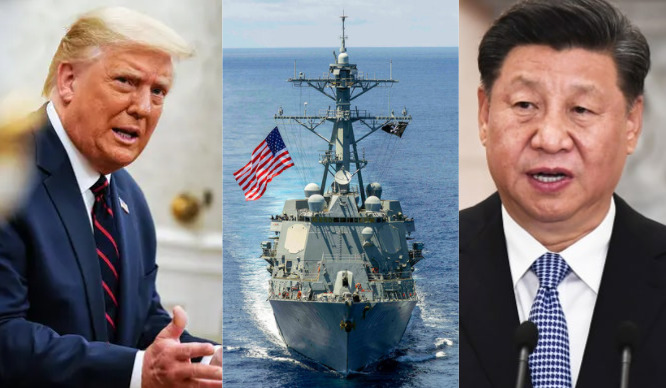After several years of belligerence in the South China Sea, Beijing seems to be stepping back in the hotly contested waterways. China is reportedly looking for a legally binding Code of Conduct in the disputed waterways with the US announcing a tough approach in the maritime region. Till now, China didn’t care for maritime laws but since the US is now prepared to give it a bloody nose, Beijing wants to calm tempers.
As per a latest SCMP report, China called up diplomats from the ten ASEAN members in early August, merely three weeks after the US Secretary of State Mike Pompeo announced his country’s new position on the South China Sea. A seemingly rattled China pushed for renewed efforts to negotiate a Code of Conduct during the said meeting.
People familiar with the early August meeting have told SCMP that Beijing’s official in charge for Maritime and Boundary Affairs expressed his country’s concerns about the “high risk” from military activities by “non-regional countries” in a veiled reference to the United States.
The Chinese official also asked the Association of Southeast Nations (ASEAN) to work closely with Beijing. The Chinese official is learnt to have said that Beijing and the ASEAN must resume negotiations for an elusive Code of Conduct (COC) in the South China Sea as soon as possible, “to show some progress”.
Without naming the US, the Chinese official added that Beijing doesn’t want the process to get “hijacked” by countries not part of the negotiation.
The sudden goodwill from Beijing must have come as a major relief for Southeast Asian nations like Indonesia, Malaysia, Vietnam, the Philippines and Brunei, all of whom have been constantly bullied by China. The ASEAN countries now feel that with the latest move to make peace in the disputed waterways, China is trying to keep its Asian neighbours close and keep Washington at bay.
The Trump administration in the US has been signalling a tougher approach against China in the South China Sea by declaring Beijing’s extra-territorial claims as “unlawful” and also denouncing the “nine-dash line” theory. Therefore, Beijing has realised that it has no practical option but to work out a legally binding Code of Conduct.
As a result, tables have turned in the South China Sea. While the ASEAN has been pushing the idea of a South China Sea COC since 1996, China has been reluctant towards signing a legally binding commitment to behave in the contested waterways.
In 2002, China and the ASEAN did settle for a non-binding Declaration on the Conduct of Parties in the South China Sea (DOC). But much headway wasn’t made into the DOC. The first draft of guidelines to give effect to the 2002 DOC was drawn up in 2005, yet the Declaration wasn’t adopted until 2011. Nevertheless, South China Sea tensions simmered throughout the 2000s and have peaked since 2009.
Due to Chinese reluctance, things have moved slowly when it comes to formalising the rules of engagement in the South China Sea. In 2013, negotiations were started for a supposedly binding COC, and in 2018 an agreement was reached on a “Single Draft Negotiating Text” that would form the basis of future negotiations for a Code of Conduct.
In November 2019, Beijing had promised a three-year timeframe to finish the Code by 2021, but progress has been slow because Beijing spent a good part of the ongoing year in extending its illegal claims in the South China Sea and bullying its maritime neighbours in Southeast Asia.
But now ASEAN diplomats say that China is showing more willingness to discuss means for resolving issues in the South China Sea, a departure from Beijing’s general reluctance to move towards a final solution.
China understands that if the South China Sea disputes get completely internationalised, then the Chinese PLA Navy will find it hard to ward off the threat faced by the US Navy, especially in the absence of any finalised rules of engagement in the region. Moreover, the US is further bolstered by its QUAD allies- India, Australia and Japan to pursue a forceful strategy against China in the disputed waterways. This explains the changing ASEAN-China power equations.
Collin Koh, a research fellow at the S Rajaratnam School of International Studies of the Nanyang Technological University in Singapore describes the new US position as a “morale boost” to the ASEAN members giving them greater bargaining power when it comes to meeting China on the diplomatic table for a South China Sea COC.
The ASEAN’s enhanced political and diplomatic heft was visible in June itself when it stated, “We reaffirmed that the 1982 UNCLOS is the basis for determining maritime entitlements, sovereign rights, jurisdiction and legitimate interests over maritime zones.”
Koh adds that the US pressure could ultimately push China to enter a legally binding Code in the South China Sea. An expansionist China is thus being put in its place and coerced to respect international laws against its consent or will.








